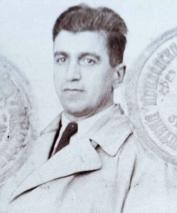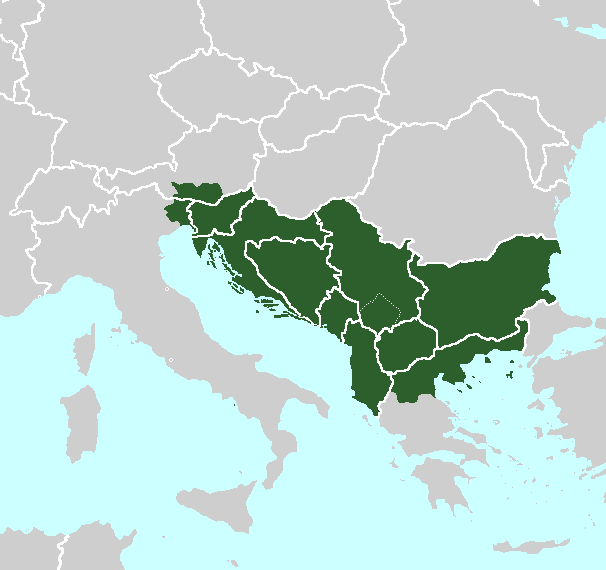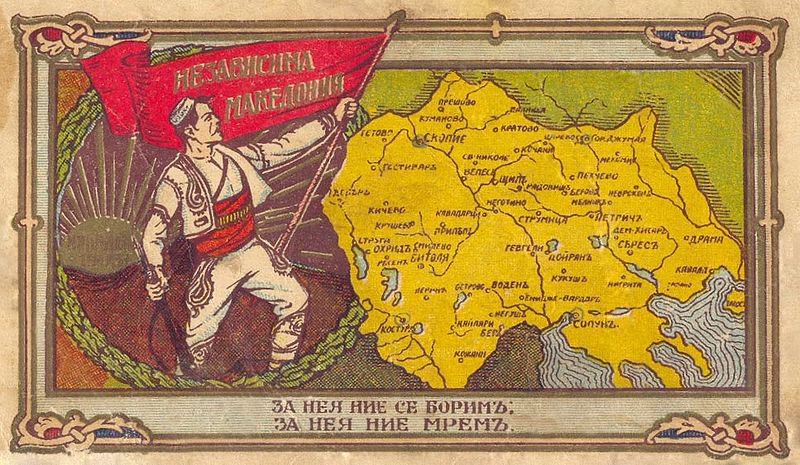|
Metodi Shatorov Sharlo
Metodi Tasev Shatorov (; , known also under the pseudonyms Sharlo and Panayot; January 10, 1897 – September 1944) was a Bulgarian Communist Party activist and also the temporary leader of the Regional Committee of Communists in Macedonia in 1940-1941. Shatorov was one of the founders of the Internal Macedonian Revolutionary Organization (United) (IMRO (United)) in 1925. Like most IMRO (United) members during the 1930s he adopted a distinct Macedonian national identity. However, such Macedonian communist functionaries, originating from the Bulgarian Communist Party (BCP) and IMRO (United), maintained strong pro-Bulgarian sentiments.''Bulgaria during the Second World War'' Marshall Lee Miller, Stanford University Press, 1975,, pp. 130-131. The name of Shatorov became a taboo in |
September Uprising
The September Uprising (, ''Septemvriysko vastanie''), also called the September Riots (Септемврийски бунтове),Голяма енциклопедия България, том 10, Главен редактор акад. Васил Гюзелев, Българска академия на науките, Книгоиздателска къща Труд, София, 2012, с. 3992, ISBN 978-954-8104-32-6 (т.10) ISBN 978-954-398-156-4 (т.10) was a 1923 communist insurgency in Bulgaria. The Bulgarian Communist Party (BCP) attempted to overthrow Alexandar Tsankov's Democratic Alliance (Bulgaria), new government established following the 9 June coup d'état, coup d'état of 9 June. Background After the conclusion of World War I in Bulgaria, Ferdinand I of Bulgaria, Tsar Ferdinand abdicated in favor of his son, Boris III of Bulgaria, Boris III, who became the new Tsar and freed opposition leaders, including Aleksandar Stamboliyski, the leader of the Bulgarian Agraria ... [...More Info...] [...Related Items...] OR: [Wikipedia] [Google] [Baidu] |
United Macedonia
United Macedonia (), or Greater Macedonia (), is an irredentist concept among ethnic Macedonian nationalists that aims to unify the transnational region of Macedonia in Southeastern Europe (which they claim as their homeland and which they assert was unjustly divided under the Treaty of Bucharest in 1913) into a single state that would be dominated by ethnic Macedonians. The proposed capital of such a United Macedonia is the city of Thessaloniki (''Solun'' in the Slavic languages), the capital of Greek Macedonia. History The roots of the concept can be traced back to the 1910 First Balkan Socialist Conference as a possible solution of the Macedonian Question. The Macedonian Scientific and Literary Society sought for the creation of an independent Macedonia, encompassing the entire geographic region of Macedonia, according to maps drawn by the society itself. In 1913 they send a memorandum of independence of Macedonia to the Great Powers and another to the countries of the Bal ... [...More Info...] [...Related Items...] OR: [Wikipedia] [Google] [Baidu] |
Independent Macedonia (IMRO)
Independent Macedonia was a conceptual project of the Internal Macedonian Revolutionary Organization (IMRO) to create an independent Macedonia, during the interwar period. History Prelude The predecessor of the concept of ''Independent Macedonia'' appeared initially in the late 19th century as variant called '' autonomous Macedonia'' in the documents of the Internal Macedonian-Adrianople Revolutionary Organization. The organization was founded in 1893 in Ottoman Thessaloniki by a small band of anti-Ottoman Macedono-Bulgarian revolutionaries. The idea then was strictly political and did not imply a secession from Bulgarian ethnicity, but unity of all nationalities in the area, then under Ottoman control. During the Balkan Wars and the First World War the organization supported the Bulgarian army and joined to Bulgarian war-time authorities when they temporarily took control over mosts of Thrace and Macedonia. In this period autonomism as a political tactic was abandoned and ... [...More Info...] [...Related Items...] OR: [Wikipedia] [Google] [Baidu] |
Communists
Communism () is a sociopolitical, philosophical, and economic ideology within the socialist movement, whose goal is the creation of a communist society, a socioeconomic order centered on common ownership of the means of production, distribution, and exchange that allocates products in society based on need.: "One widespread distinction was that socialism socialised production only while communism socialised production and consumption." A communist society entails the absence of private property and social classes, and ultimately money and the state. Communists often seek a voluntary state of self-governance but disagree on the means to this end. This reflects a distinction between a libertarian socialist approach of communization, revolutionary spontaneity, and workers' self-management, and an authoritarian socialist, vanguardist, or party-driven approach to establish a socialist state, which is expected to wither away. Communist parties have been described as ra ... [...More Info...] [...Related Items...] OR: [Wikipedia] [Google] [Baidu] |
NLWM
World War II in Yugoslav Macedonia started with the Axis invasion of Yugoslavia in April 1941. Under the pressure of the Yugoslav Partisan movement, part of the Macedonian communists began in October 1941 a political and military campaign to resist the occupation of Vardar Macedonia. Officially, the area was called then Vardar Banovina, because the use of very name ''Macedonia'' was avoided in the Kingdom of Yugoslavia. Most of its territory was occupied by Bulgaria, while its westernmost part was ceded to Albania, both aided by German and Italian troops. Initially, there was no organised resistance in the region because the majority of the Macedonian Slavs nurtured strong pro-Bulgarian sentiments, although this was an effect from the previous repressive Kingdom of Yugoslavia rule which had negative impact on the majority of the population.''"The warm reception accorded the Bulgarian soldiers was in large part the result of Macedonian resentment at three decades of Serbi ... [...More Info...] [...Related Items...] OR: [Wikipedia] [Google] [Baidu] |
Communist Party Of Yugoslavia
The League of Communists of Yugoslavia, known until 1952 as the Communist Party of Yugoslavia, was the founding and ruling party of SFR Yugoslavia. It was formed in 1919 as the main communist opposition party in the Kingdom of Serbs, Croats and Slovenes and after its initial successes in the elections, it was proscribed by the royal government and was at times harshly and violently suppressed. It remained an illegal underground group until World War II when, after the invasion of Yugoslavia in 1941, the military arm of the party, the Yugoslav Partisans, became embroiled in a bloody civil war and defeated the Axis powers and their local auxiliaries. After the liberation from foreign occupation in 1945, the party consolidated its power and established a one-party state, which existed in that form of government until 1990, a year prior to the start of the Yugoslav Wars and breakup of Yugoslavia. The party, which was led by Josip Broz Tito from 1937 to 1980, was the first communi ... [...More Info...] [...Related Items...] OR: [Wikipedia] [Google] [Baidu] |
Regional Committee Of The Communists In Macedonia
The Regional Committee of Communists in Macedonia was the provincial communist organization in Vardar Macedonia from 1939 to 1943. History At the beginning of 1939, the Central Committee of the Communist Party of Yugoslavia decided that Vardar Macedonia should form a regional committee. Svetozar Vukmanović was sent to Skopje in August of that year, and the local committee was organised under his leadership on 8 September. The Serb Blagoje Orlandić, was chosen as secretary. After organising a large demonstration in Skopje in December, Orlandić was arrested and sentenced to one year in prison. In February 1940, a new regional-committee leadership was elected at a meeting; Metodi Shatorov - Sharlo was elected secretary. In June, a national regional-committee program was drawn up. A September 8, 1940 conference was held near Skopje, at which a political resolution was drafted and new leadership was elected. Under Shatorov's leadership, the Macedonian regional committee followed ... [...More Info...] [...Related Items...] OR: [Wikipedia] [Google] [Baidu] |
Vardarska Banovina
The Vardar Banovina, or Vardar Banate (Macedonian and ; ), was a province (banate) of the Kingdom of Yugoslavia between 1929 and 1941. History It was located in the southernmost part of the country, encompassing the whole of today's North Macedonia, southern parts of Southern and Eastern Serbia and southeastern parts of Kosovo and Serbia. It was named after the Vardar River and its administrative capital was the city of Skopje. According to the 1930 statistics of the Central Press Bureau of the Ministerial Council out of the 9 Yugoslav banovinas, the "Vardarska" banovina was the largest at ; while its population, was the fourth at 1,386,370 inhabitants. Following the First World War, in Vardar Macedonia and in the so-called Western Outlands, the local Bulgarian (Macedonian Bulgarian) population was not recognized and a state-policy of Serbianisation occurred.Papavizas, George C. (2015). Claiming Macedonia: The Struggle for the Heritage, Territory and Name of the Historic Hellenic ... [...More Info...] [...Related Items...] OR: [Wikipedia] [Google] [Baidu] |
Kingdom Of Yugoslavia
The Kingdom of Yugoslavia was a country in Southeast Europe, Southeast and Central Europe that existed from 1918 until 1941. From 1918 to 1929, it was officially called the Kingdom of Serbs, Croats, and Slovenes, but the term "Yugoslavia" () has been its colloquial name as early as 1922 due to its origins. "Kraljevina Jugoslavija! Novi naziv naše države. No, mi smo itak med seboj vedno dejali Jugoslavija, četudi je bilo na vseh uradnih listih Kraljevina Srbov, Hrvatov in Slovencev. In tudi drugi narodi, kakor Nemci in Francozi, so pisali že prej v svojih listih mnogo o Jugoslaviji. 3. oktobra, ko je kralj Aleksander podpisal "Zakon o nazivu in razdelitvi kraljevine na upravna območja", pa je bil naslov kraljevine Srbov, Hrvatov in Slovencev za vedno izbrisan." (Naš rod ("Our Generation", a monthly Slovene language periodical), Ljubljana 1929/30, št. 1, str. 22, letnik I.) The official name of the state was changed to "Kingdom of Yugoslavia" by King Alexander I of Yugosla ... [...More Info...] [...Related Items...] OR: [Wikipedia] [Google] [Baidu] |
World War II
World War II or the Second World War (1 September 1939 – 2 September 1945) was a World war, global conflict between two coalitions: the Allies of World War II, Allies and the Axis powers. World War II by country, Nearly all of the world's countries participated, with many nations mobilising all resources in pursuit of total war. Tanks in World War II, Tanks and Air warfare of World War II, aircraft played major roles, enabling the strategic bombing of cities and delivery of the Atomic bombings of Hiroshima and Nagasaki, first and only nuclear weapons ever used in war. World War II is the List of wars by death toll, deadliest conflict in history, causing World War II casualties, the death of 70 to 85 million people, more than half of whom were civilians. Millions died in genocides, including the Holocaust, and by massacres, starvation, and disease. After the Allied victory, Allied-occupied Germany, Germany, Allied-occupied Austria, Austria, Occupation of Japan, Japan, a ... [...More Info...] [...Related Items...] OR: [Wikipedia] [Google] [Baidu] |
Spanish Civil War
The Spanish Civil War () was a military conflict fought from 1936 to 1939 between the Republican faction (Spanish Civil War), Republicans and the Nationalist faction (Spanish Civil War), Nationalists. Republicans were loyal to the Left-wing politics, left-leaning Popular Front (Spain), Popular Front government of the Second Spanish Republic. The opposing Nationalists were an alliance of Falangism, Falangists, monarchists, conservatives, and Traditionalism (Spain), traditionalists led by a National Defense Junta, military junta among whom General Francisco Franco quickly achieved a preponderant role. Due to the international Interwar period#Great Depression, political climate at the time, the war was variously viewed as class struggle, a War of religion, religious struggle, or a struggle between dictatorship and Republicanism, republican democracy, between revolution and counterrevolution, or between fascism and communism. The Nationalists won the war, which ended in early 1939, ... [...More Info...] [...Related Items...] OR: [Wikipedia] [Google] [Baidu] |



